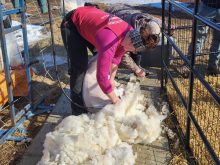Western Producer reporter Barb Duckworth traveled to Europe recently to examine food safety issues and the impact of mad cow disease on the European beef industry. Food safety issues in Europe could have profound implications for international trade and for North American beef producers
MILTON KEYNES, U.K. – A culture of food quality assurance has arisen in Great Britain.
With repeated incidents of E. coli 0157:H7 and 81 deaths linked to new variant Creuztfeld-Jacob disease, many British consumers have lost confidence in their food supply. CJD is the human form of mad cow disease.
Read Also

Charges laid after cattle theft
Saskatchewan RCMP lay two charges against a man after six cattle went missing.
For organizations like the British Meat and Livestock Commission, teaching people the source of food-borne illnesses is an ongoing challenge.
“It is a whole food chain issue,” said Mike Attenborough of the commission.
“It is not a farmer issue, an abattoir issue or a butcher issue or a consumer issue. You have to take steps across the whole of the supply chain to fix the problem.
“Consumers have got a right to expect safe, wholesome food. Similarly you have to talk to the consumer to ensure she does her part to ensure safe food.”
Attenborough is a microbiologist and the commission’s technical director dealing with the safety and eating quality of beef, pork and lamb.
The commission was formed in 1968 to improve the British livestock sector. It works with livestock producers on production issues, research, market development and promotion. It is funded by a producer and processor levy collected at the time of slaughter.
Working with the commission, the Food Standards Agency is implementing hazard analysis critical control points systems at all levels of food processing.
It is enforced through legislation and voluntary compliance.
The agency was formed last April by the ministries of agriculture and health. It is independent of the government, but must report to the national health department.
E. coli 0157:H7 bacteria has received extra attention following a series of outbreaks.
More than 1,000 cases per year have been reported in the last five years. The peak year was 1997, when about 1,400 cases were reported.
That year, a serious outbreak in Scotland killed 17 and sickened at least another 600. It was traced to poor hygiene in a retail butcher shop.
“Their understanding of biodegradable and biocide was rather poor,” said Attenborough.
“They were using the wrong cleaning agents.”
Education starts in the farmyard.
A national effort is in place to ensure all animals leave the farm clean and dry. If they are soiled with mud and manure when they arrive at the slaughterhouse, they are pulled aside and washed. The farmer gets the cleaning bill.
A fleece score was developed for sheep, with one being the cleanest and five being the worst. A score of one or two is acceptable.
Also, work is ongoing with abattoirs to institute HACCP principles at every step of the processing chain.
Steam pasteurization of carcasses in abattoirs has been researched. A published report is expected soon.
The Marks and Spencers food chain has already installed the pasteurization program in its abattoir.
Other processors are waiting for further evidence that it effectively removes all pathogens.
Two years ago, an even more ambitious initiative involved HACCP training for 7,200 butchers across the United Kingdom.
The voluntary program is open to anyone selling raw or processed meat. It was sponsored by the department of health and is administered by the meat and livestock commission.
Organizers found that most butchers are skilled in cooking methods but need further education in hygiene and HACCP concepts. Participants must pass an exam and cannot sell products until they have been certified.
“The carrot was that it was voluntary. The stick was that legislation is coming which is going to say ‘no HACCP, no licence, no trade,'” Attenborough said.
The $8.3 million program involves an ongoing series of independent audits and inspections.
People like Attenborough want to see food technology returned to the national curriculum because too many young people do not know how to handle and cook food safely.
Children between the ages of 11and15 in England and Wales study food technology as an option.
Food studies are mandatory in Scotland.

















